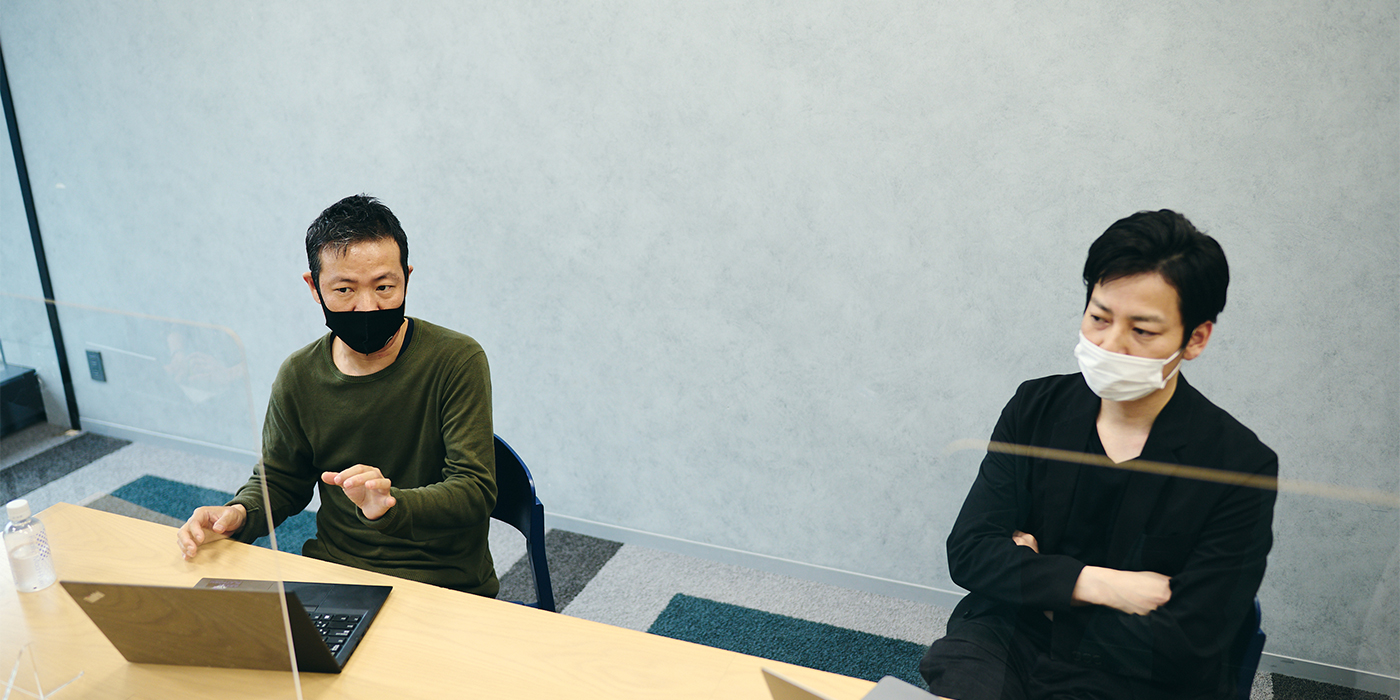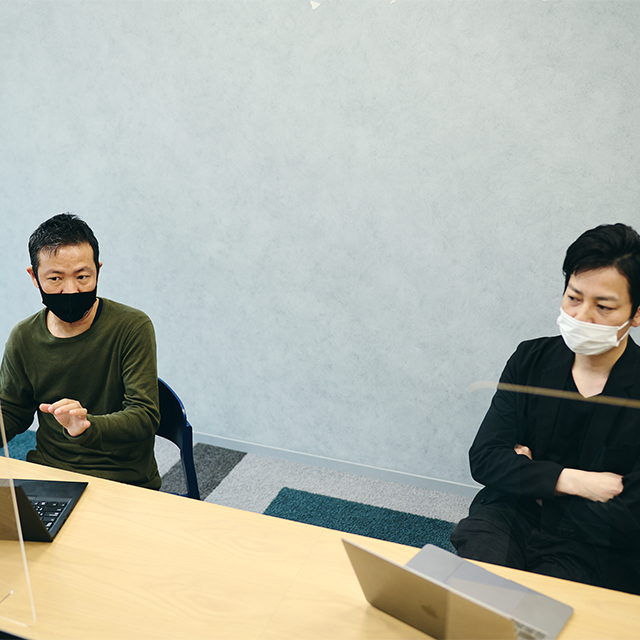Avex Technologies (ATS) announced in 2019 the launch of “A trust,” a service that uses blockchain technology to prove ownership of digital property. They have also started the beta version of Assetbank, a next-generation IP*1 distribution system in April of 2021, marking their entry into the IP and digital content protection world of NFTs*2. We sat down with the CEO of ATS, Asahi Iwanaga (Iwanaga) and Blockchain/ATS project strategy leader Shuto Yamamoto (Yamamoto) to learn more about the future of Avex × Blockchain*3 while focusing on Avex’s sense of mission.
(*1)IP:IP: Intellectual Property. Property, such as an idea, invention, or process that derives from the work of the mind or intellect. In the entertainment industry it sually refers to digital creative work or data such as music, art or artists, anime, video pieces, games, characters, etc..
(*2)NFT: Non Fungible Token. A unique digital identifier that cannot be copied, substituted, or subdivided, that is recorded in blockchain, and that is used to certify authenticity and ownership (as a specific asset and specific rights relating to it).
(*3)Blockchain. A digital database containing information such as records of financial transactions that can be simultaneously used and shared within a large decentralized, publicly accessible network, allowing for transparency and prevention of fraudulence.

(Photo left)Avex Technologies Inc. Asahi Iwanaga
(Photo left)Avex Technologies Inc. Shuto Yamamoto
The vision and
3 pillars of ATS.
Creating, distributing
and protecting IP
When we asked how they explain NFT or blockchain in their own words, we were met with the following answer.
Yamamoto “It’s hard to comprehend what is entailed when you say the word “NFT” (Non-Fungible Tokens). So when I’m asked to answer what an NFT is, I always say, ‘You don’t need to bother yourself with the technological part.”
This reply quickly lowered the hurdle of the interview for us as we attempted to wrap our heads around NFTs and blockchain technology. This stance felt very befitting of Avex and helped emphasize their seriousness in approaching this field of technology.
First, in order to get a better grip on what ATS has been up to until now, we must go back to 2018.
Iwanaga became the CEO of Avex Pictures when aNCHOR Co., Ltd., the creator of games like Muv-Luv, merged with them in 2018. From 2019 on, while creating and turning Muv-Luv into an Anime as well, they began to focus on creating IP under Avex’s strategical theme of “Entertainment×Tech×Global.
Iwanaga “Avex still places importance heavily on creating IP. Entertainment changes alongside the advancement of technology and is always growing bigger. Being very conscious of this, Avex knew they had to have a foothold in the overlapping realms of technology and next-generation entertainment so we founded ATS in May of 2019 with three main pillars to our vision; creating, distributing and protecting IP.”
ATS first launched AniCast Maker, a service using IP creation technology allowing anyone to make a short anime film in VR space, as well as the next-generation virtual figure app ARSTAGE. As for distributing IP throughout the world, they started their open payed video streaming service Z-aN in October of 2020.

Next-generation virtual figure app ARSTAGE / Avex Technologies Inc.
It was mainly the blockchain team at ATS who developed the technology—which is perhaps the main theme of this interview—for protecting the IP, “A trust” and “AssetBank.” Yamamoto, who has been the general manager of this team, first joined ATS right after they were established back in 2019. During the fourteen years before that, he had successfully built several of his own projects while living in Shanghai, including OEM in the TV and electronics industry, as well as beauty and the food and drink industry.
Yamamoto “The key factors in my decision to come back to Japan was that I thought the project seemed genuinely interesting, and that Avex had always personally been a big part of my youth.”
Fans first: ‘A trust’.
Content first: AssetBank

From here on we will shift focus to ‘A trust,’ and AssetBank as we talk about how ATS uses blockchain technology to create and protect content in the digital world.
The main problem that occurs when creating digital content is the that anyone can easily unlawfully copy it. That has kept the industry from creating a proper system to pay for such services. Plus, it was believed that things that could be copied have no rarity, no value. At least that was the common perspective until now. Iwanaga had had his eyes on the idea of implementing blockchain technology since 2017. What came next was ‘A trust,’ a service that allowed for the proof of ownership of digital contents.
Iwanaga “You’re not only able to prove you own the digital content, it’s impossible to tamper or falsify that data. The thing you have to be careful about with this, is that ‘A trust’ isn’t technology that guards against people making copies of that data.”
Yamamoto When the market switched from analog to digital, makers would prevent illegal copies from being made by adding copy control features and limitations to the audio listening platforms. However, by doing this, not only do you lose the innate enjoyment of content that is copy-able, but users are unable to watch digital content they bought on the platforms they would prefer to watch it on, not to mention it limits the overall amount of views of said content. This is pretty inconvenient. So what we did using NFTs, is made the content copy-able so that people can watch it on whatever platform they like, but the actual value of that original content is securable.”
Iwanaga “‘A trust’ allows content holders to prove the authenticity and possession of that particular digital content whether it be a single rare item or one amongst a series. In other words, it proves that everything other than said limited authentic piece is fake.”

Added value is created by issuing a proof of originality and ownership. Iwanaga believes that this creation of transparency will help deter illegal copying of the content.
Iwanaga “I thought the idea of starting a business that protects digital content through the use of blockchain was new. Instead of content holders warring with people ripping pirated versions, it would be easier to prevent a larger percent of illegal copies by adding some officialness to the entire digital content market. In 2019, ‘A trust’ collaborated with Gugenka to sell a limited number of digital prints to see if consumers would actually buy digital content that came with ownership documents. It turned out that we received over eight times as many bids than we had items for sale and sold out, proving the effectiveness of the documents. After seeing the results of that experiment, we started simultaneously designing AssetBank.”
The next-generation IP distribution system AssetBank began its operations in April of 2021. From musical compositions, digital photos and illustrations, to text, 3D models, motion data and more, IP holders are able to register their content and make their copyright information visible. This also creates a new market for license businesses.
Yamamoto “AssetBank is basically a ‘content first,’ third-party system that proves that a certain digital item is real—something important in the digital content world. For IP holders, this allows them to leverage the copyrights of their digital content for business for the first time. Up until now companies were selling content in packages like CDs and DVDs but from now on we’ll be able to separate the content into finer subdivisions, for instance dance motions, backgrounds, stage attire and so on. In other words, we’re able to discover new products by subdividing digital assets. On the other hand, ‘A trust’ is fans-first, so fans are able to handle NFTs in easy manner. Usually, in order to buy an NFT people would have to have cryptocurrency, in which they would have to register with a securities company, go through an identity verification process, and keep track of their passwords by themselves. But with ‘A trust’ all you need is an ID and a password.”
Creating a system that could safely manage the copyrights of content was difficult for Avex to do alone. This lead to the birth of JCBI (Japan Contents Blockchain Initiative), a corporate union of 11 content handling companies throughout Japan.
Yamamoto “In the first place, there are a lot of factors in the copyright laws of Japan that are getting way behind the times. With that said, the government does have their eyes firmly set on a secondary creative market and was acting to change the copyright rules of this digital age*4. So we took the initiative to speak with the governmental taskforce about the redefinition of copyrights and moreover, we advocated for creating AssetBank to be operated as a consortium.”
“Making an experience for
playing with and
enjoying the content”
The mission of an
IP creative company

“From a creator’s point of view, receiving royalties every time your artwork is resold is like a dream,” says Iwanaga. On that note, if AssetBank is able to successfully establish the distribution system based on the proof of ownership features that ‘A trust’ provides, it would be a game-changing innovation for the digital content world and creators. However, there are a few factors to be careful of in order for this project to stay around for the long game.
Iwanaga “There are a lot of people buying NFTs as if they were stocks or for speculative investment reasons, but for entertainment purposes there needs to be a place or function for people to put what they bought to use and I feel there is still a big hole to be filled there. For instance, there could be streaming sites only for people who own a certain NFT, or certain special content only for people who have collected a certain amount of them. There is still no incentive to buy and sell, or a way to play with and enjoy what you buy. We want to come up with a way to experience, to play with and enjoy that content. I don’t mean to speak ill of investing in NFTs as assets, but when it comes to designing a form of entertainment for them, I think there is a lot of potential there for us and our genre.”
Yamamoto “In the end our goal is, put simply, to be able to do the same things in the digital world that we do in the real world. You’ll be able to play and have fun with that content the way you would in reality. They would gain value as time passed and depending on who owned it before you it could gain prestige and you could transfer and trade them. But when it comes to those kinds of NFTs, which, technology-wise, we are able to create now, there is still no community of people who would buy for entertainment purposes at this stage.”
The underlying message that ATS wants the world to know is fairly simple; that whether it be in the real world or the digital world, content is for the fans, and they place importance on the value of playing with and enjoying that content. Behind their efforts and the recent developments is another hidden message aimed at the industry; that it shouldn’t lose its essence.
Iwanaga “The rules will undoubtedly change again in the future, and when the laws change their will be some type of new regulation to obey. How companies deal and adjust will become critical. We’re very conscious of how we should develop our business with all that in mind. There is a lot to keep track of, but we want to continue providing our artists’ fans, who are so important to us, what we have been for so long, but in a way that suits them best. There are a lot of people outside of Avex joining ATS and I think there are many eyes on us to see how it all goes.”
Yamamoto “To expand on that, one of our goals when we first started this ATS blockchain project was that when those rules do change, we’re standing on the side that changed them. We’re thinking about how we can cooperate to make better rules, instead of just following the ones that we’re given. We’re rolling out AssetBank through JCBI and taking part in the taskforce meetings with the Ministry of Economy, Trade and Industry and the government all so that we can be a part of making the rules. As of now, out of the group of rule makers, we are the only content holders raising our voices in order to be on the side of the rule makers.”
Avex has developed as an IP creative corporation over the past thirty years, an industry whose creators, now in the digital age are battling with pirating, not to mention many other issues. It has become a mission of Avex’s to create a new market by shining light on problems regarding copyright laws and building a framework and system on which to provide a product that can protect that IP as well. What becomes critical here, is not to conform the content to the technology, but to bring technology closer to the content. “Looking back on all that Avex has accomplished up until now,” says Iwanaga, “we must be sure not to let this technology ruin the history that Avex has built up as an IP creative corporation.” As one can tell, ATS is well on their way into the realm of the unknown, with strong conviction.

(Photo left)
Avex Technologies Inc.
President and CEO
Asahi Iwanaga
(Photo right)
Avex Technologies Inc.
Shuto Yamamoto









